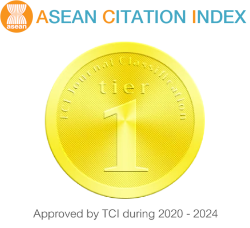Standard Requirements for Smoke-Free Hospital 2023 versus Program and Disease Specific Standard 2020: Differences and Similarities
Keywords:
smoke-free hospital standard, program and disease specific standards, hospital standardsAbstract
In 2023, Thailand started collaborating to upgrade the smoke-free hospital standard to the program and disease specific standard (PDSS). A comparative study of the similarities and differences in these two standard requirements would be beneficial to hospitals planning to apply for the PDSS certification particularly nicotine addiction. This study compared the differences between the two standards in 3 areas: 1) application documents, 2) number and details of requirements, and 3) scoring for decision-making. The study found that 1) the documents requesting for the PDSS certification were higher in both number and items within the documents. 2) The number of requirements for the two standards were consistent but differed in detail. Smoke-free hospital standard was specific to the process and outcome of smoking cessation, but the PDSS focused on patient care process and key hospital system of interdisciplinary teamwork. 3) Both standards employed the same 1–5-point scoring guideline. The smoke-free hospital standard calculated scores of 1-7 criteria separated from criterion 8 and weighting for the overall scores without specified passing minimum score. The PDSS required part III-patient care process scores of higher than 3.0. For PDSS certification, hospitals should start from 1) establishing a multidisciplinary team, 2) creating an action plan for accreditation, 3) setting performance indicators and targets, to 4) promoting continuity quality improvement. For new hospitals, it may take at least 3 years to see results and care process improvements.
References
Research and Knowledge Management Center for Tobacco Control. Catch the culprit secondhand smoke. Keep up with research with the TRC. 2013. p 2-20. (in Thai)
National Alliance for Tobacco Free Thailand. Summary of the work of the synergy plan for a smoke-free Thailand, creating good health 2018-2020. Bangkok: National Alliance for Tobacco Free Thailand; 2021. (in Thai)
Tobacco Product Control Committee, Department of Disease Control Strategy, and Organizational Development Group. Action plan National Tobacco Control 2022-2027. 1st ed. Bangkok: Aksorn Graphic and Design; 2022. (in Thai)
Rungruanghiranya S, Auamkul N. Smoke-free hospital standard revised edition 2023. Medical professional network to control tobacco consumption. The Medical Association of Thailand under the Royal Patronage; 2023. (in Thai)
Rungruanghiranya S. Quality development according to smoke-free hospital standards. Pilot Hospital. Paper presented at: Seminar on Assessment and Certification of Disease-Specific Certification Standards/Nicotine Treatment Systems; 2023 Aug 16; Rama Gardens Hotel, Bangkok, Thailand. (in Thai)
Limpanyalert P. Program disease/system specific certification assessment process. Pilot Hospital Paper presented at: Seminar on Assessment and Certification of Disease-Specific Certification Standards/Nicotine Treatment Systems; 2023 Aug 16; Rama Gardens Hotel, Bangkok, Thailand. (in Thai)
Healthcare Accreditation Institute (Public Organization), the National Network Confederation for a Smoke-Free Thai Society, the Medical Professional Network for Tobacco Control. Memorandum of Understanding for Academic Cooperation and Development of Health Service Systems to Promote Health, Prevent, Treat, and Reverse Nicotine Addiction Through Quality Development and Certification Processes. Nonthaburi, Thailand. Nonthaburi: Healthcare Quality Assurance Institute; 2023. (in Thai)
Sirichotiratana N, Phruthipinyo C. Tobacco products: policies and control measures for health. Bangkok: Charoendee Mankong Printing; 2017. (in Thai)
Healthcare Accreditation Institute (Public Organization). Disease-specific/system-specific standards. June 2020 edition. Nonthaburi: Healthcare Accreditation Institute; 2020. (in Thai)
Auamkul N. Standards for hospitals tobacco-free places items 7 and 8. Pilot Hospital Paper presented at: Seminar on Assessment and Certification of Disease-Specific Certification Standards/Nicotine Treatment Systems; 2023 Aug 16; Rama Gardens Hotel, Bangkok, Thailand. (in Thai)
Assessment and Certification Office Healthcare Quality Accreditation Institute Public organization. Steps for surveying and documents that must be prepared for Program and Disease Specific Standards SD-ACD-021-00. Nonthaburi: Healthcare Accreditation Institute; 2021. (in Thai)
Healthcare Accreditation Institute (Public Organization). Standard user manual HA SD-ACD-015-00. Nonthaburi: Healthcare Accreditation Institute; 2019. (in Thai)
Assessment and Certification Office, Healthcare Accreditation Institute (Public Organization). Details of preparation for the visit to evaluate and certify disease-specific/system-specific Program and Disease Specific Standards SD-ACD-022-00. Nonthaburi: Healthcare Accreditation Institute; 2021. (in Thai)
Downloads
Published
How to Cite
Issue
Section
License
Copyright (c) 2024 Journal of Health Systems Research

This work is licensed under a Creative Commons Attribution-NonCommercial-NoDerivatives 4.0 International License.
Journal of Health Systems Research is licensed under a Creative Commons Attribution-NonCommercial-NoDerivatives 4.0 International (CC BY-NC-ND 4.0) license, unless otherwise stated.




